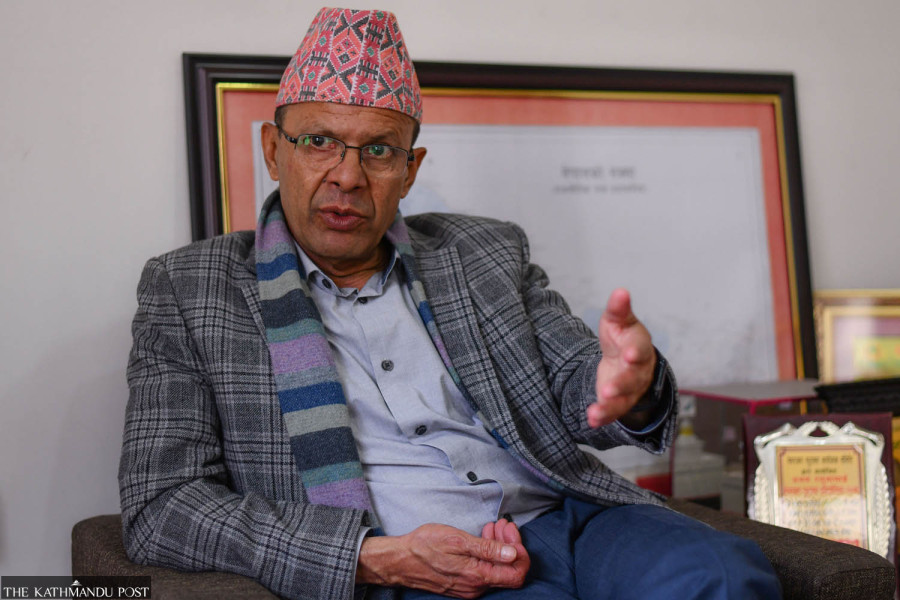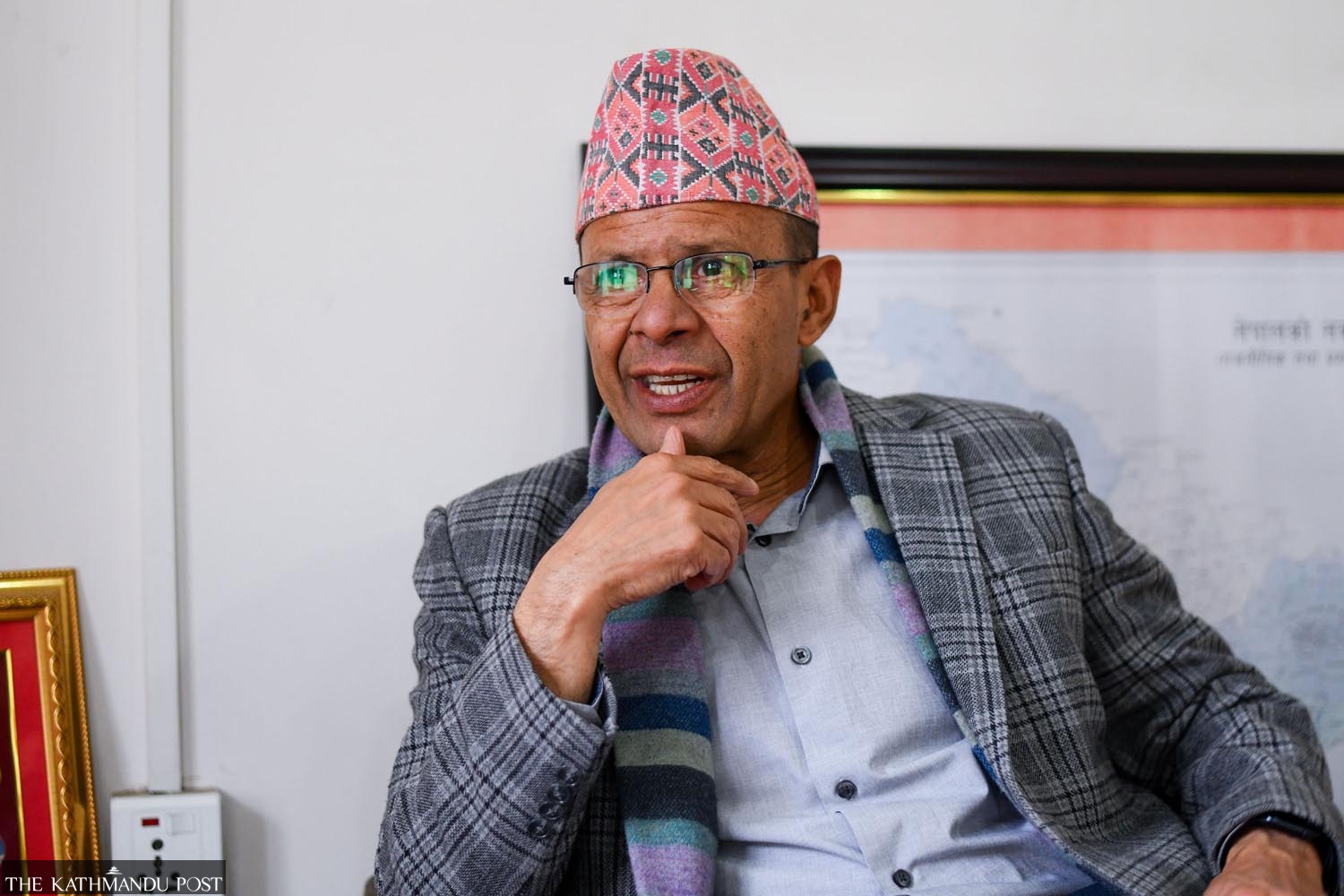Interviews
Deuba can’t save coalition if PM Oli undermines Congress
Pushpa Kamal Dahal treated Congress as a junior partner while portraying himself as the leader who had become prime minister because of his acumen.
Thira Lal Bhusal
Nepali Congress leader and former minister Minendra Rijal is known for his sharp analysis of national and regional politics. The Post’s Thira Lal Bhusal sat down with him for insights on, among other things, the Congress-UML coalition’s pledge to amend the constitution, the coalition’s longevity, and the government’s relations with neighbours.
Based on its first seven months, what is your assessment of the longevity of this coalition and government leadership handover?
I can easily see that both the leaders—KP Sharma Oli and Sher Bahadur Deuba—have clear incentives to keep this coalition intact. Prime Minister Oli would definitely like to maintain the UML’s status as the dominant communist party in the country. The longer that the NC-UML coalition holds, other communist parties would lose momentum. Their fall might be in the best interest of the UML and Oli.
Oli would like to see that happen. That may create a situation whereby other communist parties or various left groups may see their future as more secure in joining the UML bandwagon. So it’s in the best interest of UML and Oli to keep the coalition together.
Based on what I’ve heard from my party president, he would also like to see the coalition last and the politics of opportunism put to rest. Then he can lead the government and the country into the general election. So both leaders have incentives to stay together.
What about the functioning of the government? And, how comfortable is Congress working under Oli’s leadership?
Style of leadership of the two leaders is different. There are many things the prime minister could have avoided saying. If you’re already prime minister, why do you need to prove that your arguments are better than someone else’s argument? You’re the leader of the country. The prime minister should rather talk less and do more. He loves to talk. He loves to prove his point.
Conversely, Deuba is a man of few words. His speeches are short. One has to read not only from what he has said, but also from what he has chosen not to say. And if you don’t read both what he has said and what he has chosen not to say, you would not know what he is trying to say.
In the government led by Prachanda [Pushpa Kamal Dahal], Congress was perceived as a junior partner. NC, the largest party, gave unconditional support to Prachanda. But, in everyday narrative, Prachanda was portraying himself as the leader who has become the prime minister because of his acumen. It was portrayed as if Prachanda was running the show and Congress was a sucker.
If Oli also falls into that mode, then even if Deuba wants to give all his support, it will be very difficult for the NC to hang in the coalition for too long—if people in general start seeing NC as a junior partner. So my sincere advice to the prime minister would be don’t undermine the partner. Otherwise, even if Deuba stops everyone from walking away, there will be a very strong movement within the party or discussion within the party to move away from the coalition.
Congress and UML forged a coalition citing the need for the constitution amendment. Was the time ripe for amendment?
I think so. After we promulgated the constitution in 2015, Oli and Prachanda forged an electoral alliance in 2017 and later merged their parties in 2018. They pledged to the people that the left force was there to provide stability. Three years down the road, they could not stay together. Not only that, even the UML split vertically. Thus an experiment of left unification went in vain. The perennial politics of coalition building in whatever name was given continuity.
In the 2022 election, we [Congress] formed an alliance with Maoist Centre and other parties. No sooner had we come back from the election, Prachanda knew he was not getting support of our party to become prime minister. Then, Oli came forward to offer support to make him prime minister. Thus, we are constantly looking out to outmaneuver each other.
Governance suffered owing to constant change of guards in the past seven-eight years. Democratic accountability has suffered. So our electoral system needs an amendment, but in such a way that the inclusivity of the representation is not compromised.
How can the problem be fixed through an amendment of the electoral system?
It can be. That’s the reason I advocated that the NC and the UML should come together, even when our party president was not even willing to listen to the idea. I have been basically advocating and arguing for keeping 165 FPTP constituencies intact and decreasing the Proportional Representation (PR) seats from 110 to 69. We can achieve it by not reducing the ratio of the inclusivity and the diversity that exists at present.
How can it be done?
I give you one example. I am a Khas-Arya male. Why do I need a seat in the PR category? I can get elected through the FPTP seat. The disadvantages faced by women, minorities and Dalits are profound. They should be represented in the PR category. If we can remove representation of those who are adequately represented in the FPTP category, you can reduce the PR seats from 110 down to 60 in the lower House. Out of the total 165 FPTP seats, if the NC and UML and other political parties run on their own, the NC or UML can win anywhere from 70 to 85 in a very good election cycle.
In a less positive environment, we at least win 70-75 seats, and then add to that another 20-25 seats from the PR side. The number is pretty close to the magic majority. They may win a majority in a good election cycle. If the election cycle is not good, they will be short of around 10-15 members. For that, they can find a junior partner. Then there will be, clearly, a senior partner in the ruling coalition, which leads the government.
Then people would say, well, this is a government basically led by political party A. Or the group led by political party B is in the opposition. Then there will be accountability accordingly. There’ll be a majority government and a strong opposition. This scenario will help improve governance.
Some leaders have floated the proposal to increase the threshold for PR seats. What is your view?
I am not for that. The three percent threshold for the House of Representatives and 1.5 for the provincial assemblies is good enough. It does not make sense to increase it. There are not too many political parties in Parliament. Those who have been advocating for this are basically saying that they can outmaneuver smaller political parties by increasing the threshold. If it is increased, the smaller forces can form a coalition and fight as a united front.
But some senior leaders from ruling parties including UML General Secretary Shankar Pokhrel have been strongly advocating for this.
Not only him, even some leaders from my party want to increase the threshold. They have not looked at the issue seriously because it is also related to pluralism and so many issues. If you try to increase the threshold aiming to benefit the NC or UML, why would others cooperate with the NC or UML? You cannot amend the constitution to make it easy for us alone. We cannot afford to lose sufficient consensus. If we lose sufficient consensus, we will make the situation worse.

How to decrease the total number without compromising on inclusion in the two Houses?
Let’s review how difficult it has been for different groups to win the first past the post (FPTP) election since 1991. Study the numbers. If certain groups over a period of time have at least 60 percent or two-thirds or better than their share in the population, it is clear that they can get elected through the FPTP. They do not need any other pathway. For a Dalit man or woman it is enormously difficult to contest on FPTP.
Some indigenous communities are well represented over the course of the past seven elections. We need to review these things objectively and without any prejudice to any group. Those who have bigger challenges in getting elected through the FPTP, they need to be supported through the PR category. Guaranteeing at least one-third representation of women is still a challenge. We might have to amend the National Assembly law to increase representation of women and Dalits there.
This government is struggling even to get the ordinances passed from the upper House. How can the coalition garner a two-thirds majority for constitution amendment?
If we put our minds to it, we can achieve this. One thing we have to understand is, the constitution should be amended based on sufficient consensus. We cannot say that we’ll amend it even if others are not willing to do it. We didn’t do that when we were writing the constitution. Some parties including the Maoists and Madhesi parties had walked away from the Constituent Assembly. The then prime minister Sushil Koirala toiled hard to bring them back on board.
So the NC and UML should take the initiative the way we did during the CA. We are not trying to outmaneuver one party or another by amending the constitution. This has to be something that’s of common interest. So if we think of this coalition as a platform to exclude one or the other party, then we’ll run into difficulty.
Second, the first order of businesses of this alliance should not be a constitution amendment. It is putting governance back on track and delivering. Today there is an enormous amount of frustration. We have to create a situation whereby frustration gives way to hope. And based on that confidence, we can create a mechanism whereby there will be wider consultations on constitution amendment. Then you can talk to other political parties and get them on board, and then create sufficient consensus for constitutional amendment.
But that may take years.
No. I’m not saying that. It has to be done before the next election, because if we do not get it done before the next election, then, again, we run the next election as a coalition and constantly try to outmaneuver each other. I’m talking about sufficient consensus not about full consensus. Major political parties should be on board and stay in the process.

Many argue that new political forces are going to pose a serious challenge to traditional political parties by next elections. Do you agree?
My perception is people are saying that we’ve seen enough of you. Basically the message in the last election was “mainstream political parties mend your ways, otherwise”. That’s precisely the reason why I always advocated that Congress and UML come together and generate hope. If we cannot create hope, then the constitution, which is a culmination of nearly seven decades of arduous struggle, will be in peril.
India has not invited Prime Minister Oli for a visit even seven months after his election as head of the government. This is being seen as a rift in Nepal-India relations. How do you see it?
There are very few countries in the world as fortunate as we are, because we are situated between India and China. China is already the second largest economy and India would be the third largest in less than a decade. If we have such an enormous opportunity, we should try to rise up to the challenges.
It requires us to be more attentive to the precarious balance that needs to be maintained. Honestly, our relationship with no other country can be at the expense of our relationship with India. China has been a very dependable neighbour. So there’s no reason why anything that we do with India will be at the expense of China. China and India are competing, collaborating, coordinating, and are trying to outmaneuver each other.
From there, we learn that there are many things that Nepal can do which will be acceptable to both India and China. My frustration is that we’ve not been able to do that as a nation. We have fallen prey to the temptation of portraying oneself or one’s party closer to one neighbour. Again, our relationship with any other country cannot be at the expense of India. We can maintain a good, friendly relationship with China and that should not be at India’s displeasure.
During Prime Minister Oli’s China visit, the two sides signed the framework agreement on the Belt and Road Initiative. The development however caused a sort of division within Congress. Why did this happen?
Had we clearly specified what we were trying to achieve, then we could have had honest, open, frank discussion and deliberation with our neighbour. On the other hand, we could have very forthrightly understood their sensitivities, and done things in such a way that neither would India have been offended, nor would China have thought we were putting our relationship with them at the back burner.




 17.15°C Kathmandu
17.15°C Kathmandu




.jpg&w=200&height=120)







